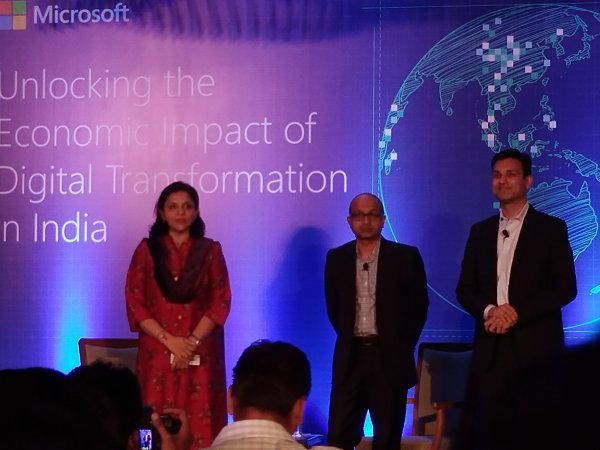At an event in New Delhi, Microsoft released a business study titled – Unlocking the Economic Impact of Digital Transformation in Asia Pacific which was produced in partnership with IDC Asia/Pacific. According to this, by 2021, digital transformation will add an estimated US$154 billion to India’s GDP, and increase the growth rate by 1.0% annually.

The study predicts a dramatic acceleration in the pace of digital transformation across India and Asia Pacific’s economies. In 2017, about 4% of India’s GDP was derived from digital products and services created directly through the use of digital technologies, such as mobility, cloud, Internet of Things (IoT), and artificial intelligence (AI).
Microsoft has stated that this survey was conducted with 1,560 business decision makers in mid and large-sized organizations across 15 economies in the region highlights the rapid impact and widespread disruption that digital transformation is having on traditional business models. The study identified five key benefits from digital transformation.
According to the research findings, organizations are seeing significant and tangible improvements from their digital transformation efforts across these benefits in the range of 11% to 14% today. Business leaders expect to see more than 40% improvements in those key areas by 2020, with the biggest jump expected in productivity, customer advocacy as well as profit margin.
The study indicates that while 90% of organizations in India are in the midst of their digital transformation journey, only 7% in the entire region can be classified as Leaders. These are organizations that have full or progressing digital transformation strategies, with at least a third of their revenue derived from digital products and services. In addition, these companies are seeing between 20 – 30% improvements in benefits across various business areas from their initiatives.
According to Sangita Reddy, Joint Managing Director, Apollo Hospitals Enterprise Ltd., one of India’s Leaders in Digital Transformation, “Apollo Hospitals recognized the potential of technologies like artificial intelligence, machine learning and data analytics in providing high quality preventive healthcare services, very early on. With data being generated at an exponential proportion, technology is helping us derive insights to predict and suggest preventive steps with utmost accuracy. Our partnership with Microsoft bring us to the forefront of this remarkable metamorphosis that is allowing us to meet healthcare demand and maintain service excellence regardless of geography.”
According to the study, the digital economy has also given rise to new types of competitors, as well as emerging technologies such as AI that have contributed to the disruption of business models.
When addressing business concerns, Leaders are focused on creating a culture of agility and innovation to counter competition. Followers, on the other hand, are more focused on improving employee productivity and profitability.. As organizations realize the potential of data as the new oil for the digital economy, Leaders are much more focused on leveraging data to grow revenue and productivity, and to transform business models.
In addition to skills and cybersecurity threats as key challenges, Leaders have also identified the need to bolster their data capabilities through the use of advanced analytics to develop actionable insights in fast-moving markets. Emerging technologies such as AI (including cognitive services and robotics) and IoT are areas where Leaders are investing.
Microsoft recommends organizations to adopt various strategies to become a digital transformation Leader such as need to build a culture of collaboration where it is connected across business functions, and has a vibrant and mature ecosystem of customers and partners. Data can then be embraced across organization and functions, where better decisions can be made and ultimately serving the needs of customers and partners better. In most cases, digital transformation efforts do not start with widespread change, but a series of micro-revolutions. These are small, quick projects that deliver positive business outcomes and accrue to a bigger and bolder digital transformation initiatives. Organizations must relook at training and reskilling its workforce so that workers are equipped with future ready skill sets such as complex problem solving, critical thinking and creativity for the digital economy.
“India is clearly on the digital transformation fast track. Within the next four years, it is estimated that nearly 60% of India’s GDP will have a strong connection to the digital transformation trends.” said Anant Maheshwari, President, Microsoft India. “Organizations are increasingly deploying emerging technologies such as artificial intelligence, and that will accelerate digital transformation led growth even further.”



















